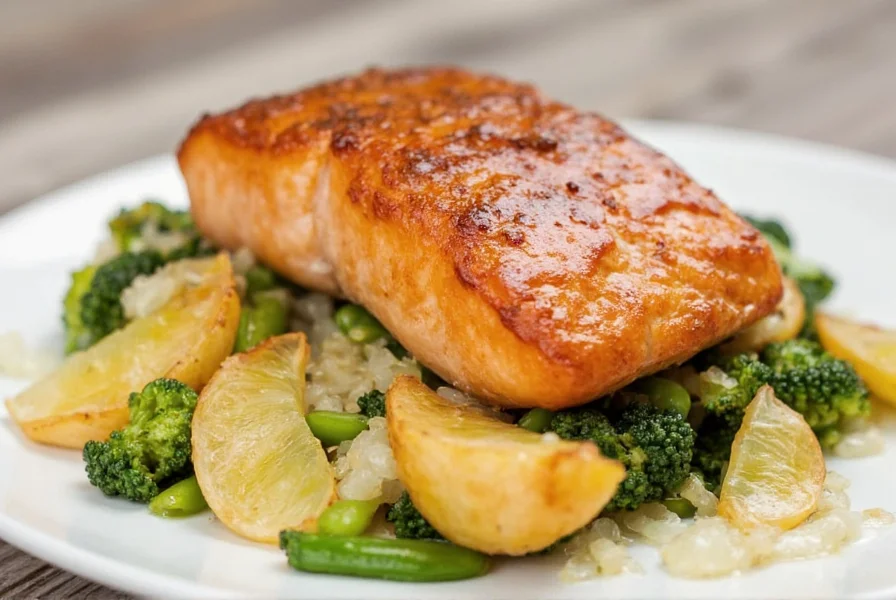If you're searching for a quick, healthy dinner option that delivers restaurant-quality flavor, soy ginger salmon is an excellent choice. This Asian-inspired preparation method transforms simple salmon fillets into a gourmet meal with minimal effort. The combination of umami-rich soy sauce and zesty fresh ginger creates a perfect balance that enhances the natural richness of the fish without overpowering it.
Why This Soy Ginger Salmon Recipe Works
Salmon's natural oil content makes it ideal for absorbing flavors while maintaining moisture during cooking. The ginger-soy marinade penetrates the surface without requiring hours of preparation, making this dish perfect for weeknight dinners. Unlike many fish recipes that can dry out easily, the natural fats in salmon protect it from overcooking, while the marinade creates a flavorful crust.
Essential Ingredients for Perfect Soy Ginger Salmon
Using quality ingredients makes a significant difference in the final result. Here's what you'll need for four servings:
| Ingredient | Amount | Preparation Notes |
|---|---|---|
| Fresh salmon fillets | 1.5 lbs (680g) | Skin-on or skinless, preferably center-cut |
| Low-sodium soy sauce | 3 tablespoons | Regular works too, but reduces saltiness |
| Fresh ginger root | 2 tablespoons | Finely grated (not powdered) |
| Fresh garlic | 2 cloves | Minced finely |
| Honey | 1 tablespoon | Or maple syrup for vegan option |
| Sesame oil | 1 tablespoon | Toast for enhanced flavor |
| Lime or lemon | 1 | For finishing acidity |
Step-by-Step Cooking Instructions
Marinating Process (15-30 minutes)
Combine soy sauce, grated ginger, minced garlic, honey, and sesame oil in a bowl. Place salmon fillets in a shallow dish and pour marinade over them, ensuring even coverage. Let sit at room temperature for 15-30 minutes—avoid marinating longer than 1 hour as the acid can begin to 'cook' the fish.
Baking Method (Recommended for Consistency)
Preheat oven to 400°F (200°C). Line a baking sheet with parchment paper. Remove salmon from marinade (reserve excess marinade) and arrange on baking sheet. Bake for 12-15 minutes until internal temperature reaches 125°F (52°C) for medium-rare or 135°F (57°C) for medium. During the last 2 minutes, brush with reserved marinade for extra flavor.
Pan-Seared Alternative (For Crispier Results)
Heat 1 tablespoon oil in oven-safe skillet over medium-high heat. Pat salmon dry and place skin-side down (if using skin-on). Cook 4-5 minutes until skin is crispy. Flip and transfer to preheated 400°F (200°C) oven for 6-8 minutes until desired doneness.
Temperature Guide for Perfectly Cooked Salmon
Using a meat thermometer ensures perfect results every time. Here's what to aim for:
| Cooking Level | Internal Temperature | Visual Indicators |
|---|---|---|
| Medium-Rare | 120-125°F (49-52°C) | Center slightly translucent, flakes gently |
| Medium | 130-135°F (54-57°C) | Mostly opaque, flakes easily with fork |
| Medium-Well | 140-145°F (60-63°C) | Completely opaque, firm texture |
Serving Suggestions and Pairings
Soy ginger salmon pairs beautifully with:
- Steamed jasmine or basmati rice
- Roasted broccoli or asparagus
- Quick-pickled cucumbers or carrots
- Fresh edamame sprinkled with sea salt
For presentation, garnish with sliced green onions, sesame seeds, and a squeeze of fresh lime juice. The acidity from the citrus brightens the rich flavors and completes the dish.
Avoiding Common Soy Ginger Salmon Mistakes
Even experienced cooks can encounter issues with this seemingly simple recipe. Here's how to avoid the most frequent problems:
- Overcooking: Salmon continues to cook after removal from heat. Remove at 125°F for medium-rare as it will rise 5-10 degrees during resting.
- Soggy skin: When pan-searing, ensure skin is completely dry before cooking and don't move the fish until the skin releases naturally from the pan.
- Bitter marinade: Don't use old or low-quality soy sauce, which can develop off-flavors. Fresh ginger is essential—bottled ginger lacks the bright flavor needed.
- Uneven cooking: Choose fillets of similar thickness or fold thinner ends under to create uniform thickness.
Dietary Adaptations and Variations
This versatile recipe accommodates various dietary needs:
- Gluten-free option: Substitute tamari for soy sauce
- Sugar-free version: Replace honey with 1-2 drops liquid stevia
- Spicy variation: Add 1 teaspoon sriracha or red pepper flakes to marinade
- Whole30 compliant: Use coconut aminos instead of soy sauce and omit honey
Storage and Reheating Guidelines
Proper storage maintains quality for leftovers:
- Refrigeration: Store in airtight container for up to 2 days
- Reheating: Warm gently in oven at 275°F (135°C) for 8-10 minutes—never microwave as it makes fish rubbery
- Freezing: Not recommended as texture deteriorates significantly
- Cold serving: Sliced thin, it makes excellent additions to salads the next day
Frequently Asked Questions
Can I use frozen salmon for soy ginger preparation?
Yes, but thaw frozen salmon slowly in the refrigerator overnight for best texture. Never cook frozen salmon directly as it will cook unevenly. Pat thoroughly dry before marinating to ensure proper flavor absorption.
How long should I marinate salmon for optimal flavor?
For soy ginger salmon, 15-30 minutes at room temperature provides ideal flavor penetration without affecting the fish's texture. Marinating longer than 1 hour can cause the acid in the marinade to partially 'cook' the surface, resulting in a mealy texture.
What's the best way to prevent salmon from sticking to the pan?
Ensure your cooking surface is properly preheated before adding oil, then heat the oil until shimmering but not smoking. Pat the salmon completely dry with paper towels before placing in the pan, and don't move it until it naturally releases from the cooking surface, typically after 3-4 minutes.
Can I substitute ground ginger for fresh in this recipe?
While fresh grated ginger provides superior flavor and brightness, you can substitute 1/2 teaspoon ground ginger for 1 tablespoon fresh. However, the flavor profile will be noticeably different—ground ginger offers warmth while fresh provides bright, citrusy notes essential to authentic soy ginger salmon.











 浙公网安备
33010002000092号
浙公网安备
33010002000092号 浙B2-20120091-4
浙B2-20120091-4